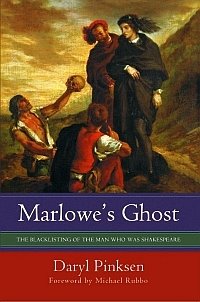
Who really wrote some of William Shakespeare's plays? A local author has won an international award for his book on that topic... and he dropped by the studio to talk about it. (Jeff Gilhooly with Daryl Pinksen)
Click HERE for podcast.
Right click to Download Dec. 14, 2009_Marlowe's Ghost [mp3 file: runs 10:02]



Congratulations Mr. Pinksen, on your Writer's Digest Award! It certainly seems well deserved.
ReplyDeleteWhen I finished Calvin Hoffman's book, I turned to yours, as I heard it was very good. And I found it so persuasive, and such good reading, it seemed difficult to not to think of Marlowe as our man. But coming across a vague reference or two elsewhere of The Earl of Oxford, I did a little reading there and found a whole host of compelling reasons to suspect him as the real Shakespeare. In some regards he seems even more likely than Marlowe.
Was a letter count of his writing ever compared to 'Shakespeare's'? And why did neither Mr. Hoffman nor yourself address the claims of the Oxford camp? Their claims for authorship surely seem worthy of a thorough airing.
Once again, thank you for a great bit of research and a great read.
Drew,
ReplyDeleteFirst off, thank you for reading my book and taking the time to comment.
When I first read a run-down of the strongest lines of evidence for the Oxford claim, my reaction was quite different from yours. I was not impressed, and even less so when measured against the evidence for the Marlowe claim. My subsequent lack of interest in the Oxford claim results from my decision to approach this subject from within the scholarly tradition.
While there is intriguing circumstantial evidence for Oxford, the literary evidence is non-existent, if not negative. While scholarship has provided a mountain of evidence citing the resemblance of the works of Marlowe to Shakespeare's, the only literary evidence we have of Oxford is a collection of workmanlike poems demonstrating erudition, but lacking any hint of Shakespearean brilliance.
The comments of Francis Meres, about how good a comedy writer Oxford was, tell us nothing, other than that Oxford was well-known in 1598 as a nobleman who had written one or more comedies. Meres' praise must be weighed against his position as a commoner speaking about a powerful nobleman.
My job, as I see it, is to propose an alternate interpretation of Shakespearean scholarship. Oxford is absent from that tradition, and not through any malevolence on the part of scholars; he simply does not factor into a discussion of the works of Shakespeare. Marlowe does.
That is why I do not consider Oxford, or Bacon, or Greville, or Neville, or any of the other circumstantial candidates as credible. The case for Marlowe, and Marlowe alone, is based on literary evidence -- real evidence.
I admire your willingness to consider various options before deciding where you stand on the authorship issue, but I don't feel any obligation to discuss the Oxford claim. Oxford's claim for Shakespeare authorship has been given a thorough airing, by Mark Anderson most recently.
Both viewpoints are available for open-minded readers, such as yourself, to read and decide who makes the better case. These two theories are mutually exclusive (I believe), and I expect my support of the Marlowe case to be understood as an outright rejection of the Oxford claim.
Daryl Pinksen